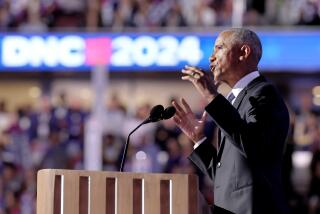Obama and the former radicals
- Share via
CHICAGO — Democrats have tried to heal their party’s angry passions ever since violent protesters disrupted the Democratic National Convention here in 1968, a shock to America’s collective psyche that helped Republican Richard Nixon capture the White House.
But some of the old fault lines were visible again Thursday as Sen. Barack Obama’s suddenly defensive presidential campaign sought to distance him from Bill Ayers and his wife, Bernardine Dohrn, aging academics who planted bombs in the Capitol, the Pentagon and other buildings to protest U.S. government policy. They are now widely respected community figures here.
The evidence linking Obama, who was born in 1961, to the two former militants, now in their 60s, remained thin, despite the appearance of a slickly produced, anonymously issued five-minute video titled “Obama’s Terrorist Connections” on YouTube that sought to exploit the alleged tie.
Obama and Ayers moved in some of the same political and social circles in the leafy liberal enclave of Hyde Park, where they lived several blocks apart. In the mid-1990s, when Obama was running for the Illinois Senate, Ayers introduced Obama during a political event at his home, according to Obama’s aides. Ayers, a professor of education at the University of Illinois at Chicago, later contributed $200 to Obama’s state campaign.
Obama and Ayers met a dozen times as members of the board of the Woods Fund of Chicago, a local grant-making foundation, according to the group’s president. They appeared together to discuss juvenile justice on a 1997 panel sponsored by the University of Chicago, records show. They appeared again in 2002 at an academic panel co-sponsored by the Chicago Public Library.
Ayers and Dohrn, an associate law professor at Northwestern University, did not return phone calls or e-mail Thursday about their relationship with Obama, their leadership of the militant Weather Underground or their decade as fugitives from the law.
But friends, neighbors and colleagues rose to their defense after Obama’s Wednesday night debate in Philadelphia with rival Sen. Hillary Rodham Clinton of New York, in which Obama was publicly quizzed about his relationship with Ayers for the first time.
Clinton noted that the two men had served on the foundation board and warned that “this is an issue that certainly the Republicans will be raising.”
Laura S. Washington, chairwoman of the Woods Fund, called it “ridiculous to suggest there’s anything inappropriate” about Ayers and Obama serving on the nine-member board of directors. The Woods Fund issued $3.4 million in grants to local arts, housing and civic groups last year from an endowment of about $70 million, she said.
Obama joined the board in 1993 and stepped down in 2002, three years after Ayers was appointed, she said. The board met four times a year to discuss policy and new grant proposals, she said.
“Bill Ayers is very respected and prominent in Chicago as a civic activist,” Washington added. “He has a national reputation as an educator. That’s why he’s on our board.”
Obama’s latest predicament stirred Chicago Mayor Richard M. Daley to issue a strong defense of Obama and Ayers, which Obama’s campaign passed on to reporters.
“There are a lot of reasons that Americans are angry about Washington politics,” Daley’s statement said. “One more example is the way Sen. Obama’s opponents are playing guilt-by-association, tarring him because he happens to know Bill Ayers.”
Daley said Ayers “worked with me in shaping our now nationally renowned school reform program.”
“I don’t condone what he did 40 years ago, but I remember that period well,” the mayor said. “It was a difficult time, but those days are long over. I believe we have too many challenges in Chicago and our country to keep re-fighting 40-year-old battles.”
Hyde Park, on Chicago’s South Side, is home to the University of Chicago, an arts center, museums and other cultural institutions. Nation of Islam leader Louis Farrakhan’s home and the headquarters of the Rev. Jesse Jackson’s Operation PUSH are within a few blocks of Obama’s red-brick home. The neighborhood’s politics are vibrant and decidedly liberal.
As a result, what is normal in Hyde Park may sound odd elsewhere in America.
Adolph Reed Jr., a political scientist at the University of Pennsylvania, knows both Ayers and Obama from his days in Chicago. He plans to vote for Clinton in Pennsylvania’s primary Tuesday. But he called the Ayers-Obama link a “bogus story.”
Reed nonetheless predicted that the relationship would “haunt” the candidate and “be used to attack him from now until his place in the race ends.”
In the debate Wednesday, Obama described Ayers as “a guy who lives in my neighborhood, who’s a professor of [education] in Chicago, who I know, and who I have not received some official endorsement from. He’s not somebody who I exchange ideas from on a regular basis.”
He added: “And the notion that . . . knowing somebody who engaged in detestable acts 40 years ago, when I was 8 years old, somehow reflects on me and my values doesn’t make much sense.”
Obama later pointed out that Clinton’s husband commuted the sentences of two former Weather Underground members, which Obama called “a slightly more significant act” than his simply knowing Ayers.
Shortly before President Clinton left office in 2001, he granted clemency to Susan Rosenberg and Linda Sue Evans, who were serving prison sentences after having been caught decades earlier with 740 pounds of dynamite and weapons.
Rosenberg also had been indicted, but never tried, for her alleged involvement in the botched 1981 robbery of an armored car in upstate New York that left three people dead, including two police officers.
--
dan.morain@latimes.com
Drogin reported from Chicago and Morain from Sacramento.
More to Read
Get the L.A. Times Politics newsletter
Deeply reported insights into legislation, politics and policy from Sacramento, Washington and beyond. In your inbox twice per week.
You may occasionally receive promotional content from the Los Angeles Times.











